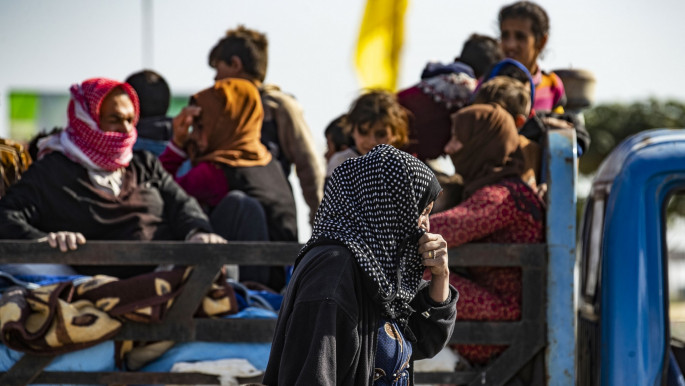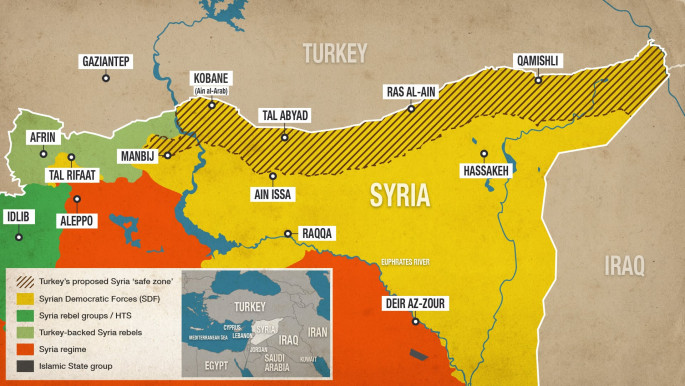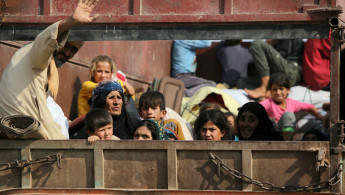'We had high hopes for America': Civilians in northeast Syria wary of Turkey-US deal
After a week of spiralling violence in northeast Syria, a deal agreed to between Turkey and the US was met with suspicion and cautious optimism among displaced residents.
On Thursday, Turkish President Recep Tayyip Erdogan and US Vice President Mike Pence announced a five-day pause in the fighting during which time the US will facilitate the withdrawal of Kurdish-led troops from a 32-kilometre safe zone along the border.
Speaking at a news conference in Ankara, Pence said the US will remove its days-old sanctions on Turkey if the ceasefire holds.
Following the announcement, Syrian Democratic Forces (SDF) Commander General Mazloum Abdi said his side had accepted the truce, which he characterised as covering the area between Ras al-Ain and Tal Abyad.
"It's a positive step," Jian*, an activist in the border town of Ras al-Ain, told The New Arab over WhatsApp. "We'll wait five days to see if we're safe."
Ahmed, a restaurant owner from the town of Tel Abyad, is similarly wary: "In principle, I am in favour of a ceasefire, but what happens next is so unclear."
Turkey and its proxy forces had been steadily advancing into northeastern Syria since US President Donald Trump announced last week the sudden withdrawal of American troops from the country.
 |
|
| Read Also: Turkey, the Kurds and the demographic re-engineering of Syria |
The decision was widely seen as an abandonment of the Kurdish-led SDF, elements of which Ankara views as terrorists because of their ties to an insurgent group inside Turkey known as the Kurdistan Workers' Party (PKK).
But for the US, the SDF had been a critical ally in the region and until recently was working alongside American forces to expel the last remnants of the Islamic State group in northeast Syria.
In an effort to stave off the Turkish incursion, the SDF reached its own deal with the government of Syrian President Bashar al-Assad on Sunday, which saw the return of regime troops in the Kurdish-controlled zone.
Ahmed, the restaurant owner, blamed the Trump administration for forcing the Kurds to side with what he regards as the lesser of two evils.
They point to other parts of the country back under government control. In those areas, the regime continues to jail perceived opponents and draft dodgers in its notorious prisons, where thousands of detainees were allegedly tortured to death in recent years. |
If the United States had not failed us and forgotten all the sacrifices we have made, we would not need to resort to the regime |  |
"If the United States had not failed us and forgotten all the sacrifices we have made, we would not need to resort to the regime," he said.
It remains to be seen what the US-Turkey deal means for the Russian-backed government troops in the northeast. But the presence of forces loyal to Assad – whose regime is considered responsible for the vast majority of civilian deaths during Syria's eight-year-long war – has left many residents fearing what's to come.
 |
|
Local reporter Kamiran worries his history of working with foreign journalists and NGOs in the region will make him a natural target should the Syrian government gain a foothold in northeastern Syria.
"It's a red line. I have two crimes in the eyes of the regime," Kamiran said of his line of work.
He believes other journalists, aid workers and wanted activists will attempt to flee to the Kurdish region in northern Iraq to avoid persecution from Syrian government forces.
"A lot of people will leave. I'm 100 percent sure about that," Kamiran said.
Under the terms of the US-brokered arrangement, the Turkish military will monitor Ankara's long-sought buffer zone. Erdogan has made no secret of his wish to drive Kurdish fighters from the area, and in their place, resettle up to two million Syrian refugees currently living in Turkey.
"Who will ensure that there is no demographic change in the area?" questioned Azad, the teacher.
He fears Turkey-backed forces will pillage the towns and villages inside this area, just as they did in the northwestern region of Afrin during a two-month-long offensive that displaced more than 100,000 residents in 2018. Rights organisations accused rebel groups of looting and destroying property belonging to the area's Kurdish residents.
"This country's history is full of repression," Azad said. "Especially towards the Kurds."
* Out of concern for their safety, The New Arab has withheld the last names of civilians mentioned in this report.
Elizabeth Hagedorn is a freelance journalist focusing on migration and conflict with bylines in The Guardian, Middle East Eye and Public Radio International.
Follow her on Twitter: @ElizHagedorn



